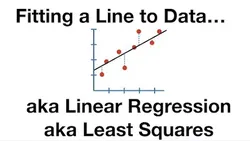
Generalized Linear Models and Nonparametric Regression 
This course provides learners with an introduction to advanced statistical modeling tools, such as GLMs, nonparametric modeling, and GAMs. It emphasizes a strong conceptual understanding of these tools, as well as ethical considerations when using them. ▼
ADVERTISEMENT
Course Feature
![]() Cost:
Cost:
Free
![]() Provider:
Provider:
Coursera
![]() Certificate:
Certificate:
Paid Certification
![]() Language:
Language:
English
![]() Start Date:
Start Date:
29th May, 2023
Course Overview
❗The content presented here is sourced directly from Coursera platform. For comprehensive course details, including enrollment information, simply click on the 'Go to class' link on our website.
Updated in [March 06th, 2023]
This course, Generalized Linear Models and Nonparametric Regression, is the final course of the Statistical Modeling for Data Science program. Learners will gain an understanding of a broad set of more advanced statistical modeling tools, such as generalized linear models (GLMs), nonparametric modeling, kernel estimators, smoothing splines, and semi-parametric generalized additive models (GAMs). The course will also cover ethical issues related to the use of complicated statistical models. This course is part of the Master of Science in Data Science (MS-DS) degree offered on the Coursera platform by the University of Colorado Boulder. The MS-DS is an interdisciplinary degree that brings together faculty from various departments, and is ideal for individuals with a wide range of undergraduate education and/or professional experience in computer science, information science, mathematics, and statistics.
[Applications]
Upon completion of this course, learners can apply the concepts of generalized linear models and nonparametric regression to a variety of data science problems. These concepts can be used to develop models for classification, prediction, and inference. Learners can also use the knowledge gained in this course to pursue further study in the field of data science, such as the MS-DS degree offered by CU Boulder.
[Career Paths]
1. Data Scientist: Data Scientists use advanced statistical modeling tools such as GLMs, nonparametric modeling, and GAMs to analyze data and develop insights. They are responsible for developing predictive models, uncovering trends, and providing actionable insights to help organizations make better decisions. Data Scientists must have a strong understanding of the underlying principles of these tools and be able to apply them to real-world problems. As data science becomes more prevalent, the demand for Data Scientists is expected to continue to grow.
2. Machine Learning Engineer: Machine Learning Engineers use advanced statistical modeling tools such as GLMs, nonparametric modeling, and GAMs to develop and deploy machine learning models. They are responsible for designing, building, and maintaining machine learning systems that can be used to automate tasks and make decisions. Machine Learning Engineers must have a strong understanding of the underlying principles of these tools and be able to apply them to real-world problems. As machine learning becomes more prevalent, the demand for Machine Learning Engineers is expected to continue to grow.
3. Business Analyst: Business Analysts use advanced statistical modeling tools such as GLMs, nonparametric modeling, and GAMs to analyze data and develop insights. They are responsible for uncovering trends, developing predictive models, and providing actionable insights to help organizations make better decisions. Business Analysts must have a strong understanding of the underlying principles of these tools and be able to apply them to real-world problems. As data-driven decision making becomes more prevalent, the demand for Business Analysts is expected to continue to grow.
4. Research Scientist: Research Scientists use advanced statistical modeling tools such as GLMs, nonparametric modeling, and GAMs to analyze data and develop insights. They are responsible for developing predictive models, uncovering trends, and providing actionable insights to help organizations make better decisions. Research Scientists must have a strong understanding of the underlying principles of these tools and be able to apply them to real-world problems. As data science and machine learning become more prevalent, the demand for Research Scientists is expected to continue to grow.
[Education Paths]
1. Master of Science in Data Science (MS-DS): This degree program provides learners with a comprehensive understanding of the principles and techniques of data science, including generalized linear models, nonparametric regression, and semi-parametric generalized additive models. The program is designed to equip learners with the skills and knowledge necessary to develop and apply data-driven solutions to real-world problems. As the demand for data science professionals continues to grow, the MS-DS degree provides learners with the opportunity to develop the skills and knowledge necessary to become successful data scientists.
2. Master of Science in Applied Mathematics: This degree program provides learners with a comprehensive understanding of the principles and techniques of applied mathematics, including generalized linear models, nonparametric regression, and semi-parametric generalized additive models. The program is designed to equip learners with the skills and knowledge necessary to develop and apply mathematical models to real-world problems. As the demand for applied mathematicians continues to grow, the MS-AM degree provides learners with the opportunity to develop the skills and knowledge necessary to become successful applied mathematicians.
3. Master of Science in Computer Science: This degree program provides learners with a comprehensive understanding of the principles and techniques of computer science, including generalized linear models, nonparametric regression, and semi-parametric generalized additive models. The program is designed to equip learners with the skills and knowledge necessary to develop and apply computer-based solutions to real-world problems. As the demand for computer scientists continues to grow, the MS-CS degree provides learners with the opportunity to develop the skills and knowledge necessary to become successful computer scientists.
4. Master of Science in Information Science: This degree program provides learners with a comprehensive understanding of the principles and techniques of information science, including generalized linear models, nonparametric regression, and semi-parametric generalized additive models. The program is designed to equip learners with the skills and knowledge necessary to develop and apply information-based solutions to real-world problems. As the demand for information scientists continues to grow, the MS-IS degree provides learners with the opportunity to develop the skills and knowledge necessary to become successful information scientists.
Pros & Cons

Relevant mathematical background.

Enhances statistical literacy.

High quality course.

Materials can be difficult to follow.

Requires dedication to meet timeline.

Not for beginners.
Course Provider

Provider Coursera's Stats at AZClass
Discussion and Reviews
0.0 (Based on 0 reviews)
Explore Similar Online Courses

Cracking the Creativity Code: Discovering Ideas

AP Psychology - Course 1: What is Psychology?

Python for Informatics: Exploring Information

Social Network Analysis

Introduction to Systematic Review and Meta-Analysis

The Analytics Edge

DCO042 - Python For Informatics

Causal Diagrams: Draw Your Assumptions Before Your Conclusions

Whole genome sequencing of bacterial genomes - tools and applications

Data Science: Linear Regression

Simple Linear Regression for the Absolute Beginner


Start your review of Generalized Linear Models and Nonparametric Regression